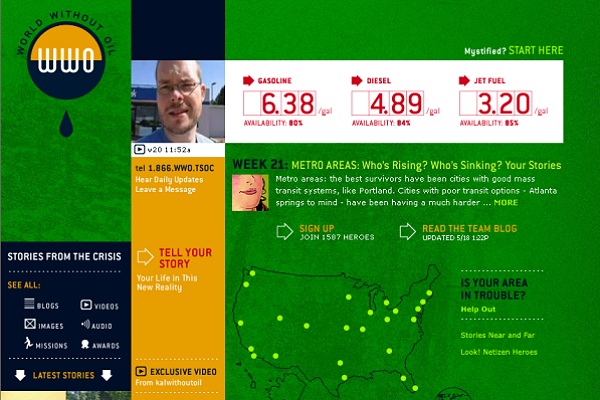Games for Cities
World Without Oil (2007)
U.S.A.
Developed by:
A serious game for the public good, inviting people from all walks of life to contribute “collective imagination” to confront a real-world issue: the risk our unbridled thirst for oil poses to our economy, climate and quality of life

World Without Oil (WWO) is an Alternate Reality Game (ARG), using the real world as a platform and employing transmedia storytelling, to deliver a story that may be altered by players’ ideas or actions. It calls attention to, and sparks dialogue around solutions to a near-future global oil shortage, post peak oil. WWO combined elements of an ARG with those of a serious game, sketching out the overarching conditions of a realistic oil shock, and then calling upon players to imagine and document their lives under those conditions. The game simulated the first 32 weeks of a global oil crisis, establishing a citizen “nerve centre” to track events and share solutions. Anybody could play by creating a personal story – via emails, phone calls, blog posts, twitter posts, videos, photos, podcasts, and so on – chronicling the imagined reality of their life in the crisis. The game encouraged excellence with daily awards and recognition for authentic and intriguing stories, with compelling player stories and ideas incorporated into the official narrative and posted daily. Links to all these stories are archived at worldwithoutoil.org. The game was announced on March 2, 2007, and its teaser site went live at that time. A countdown site appeared approximately 2 weeks before the game-start on April 30, 2007. The game concluded 32 days later, on June 1, 2007, with a detailed vision of a possible future, expressed through 1,500 personal stories posted across the Web.
WWO asked players to imagine a world reeling from a sudden oil shortage, describe how the crisis is unfolding where they live, and work together on simple and practical ways to adapt. By playing it out in a serious way, the game aimed to apply collective intelligence and imagination to the problem in advance, and create a record that has value for educators, policymakers, and the common people to help anticipate the future and prevent its worst outcomes. Essentially, WWO invited people to “Play it – before you live it.” If you want to change the future, playing with it is a good first step. This represened a milestone in the quest to use games as democratic, collaborative platforms for exploring possible futures and sparking future-changing action. WWO set the model for using a hot net-native storytelling method (‘alternate reality’) to meet civic and educational goals. This degree of ‘particibility’ puts players at the heart of a complex subject, allowing them to truly influence solution making. Via a game, WWO makes the simple truth – that there isn’t enough oil for everyone – vividly real. This marks the first step upon an entirely new and exciting terrain – one where we all play together to shape a better future. Thus, more than being immersive, the game was meaningful and satisfying.
No one today has a clear picture of oil availability or what will happen when demand inevitably outstrips supply. That will largely depend on how well people prepare, cooperate, and collectively create solutions, and before WWO, no one had ever thought to ask them what they might do. By playing it out ‘for real’, WWO evoked collective intelligence and the wisdom of crowds in advance. Their solutions – acts that mould communities, slash wasteful consumption and create more “elastic” lives – stand as vibrant antidotes to official paralysis. By creating a simple framework that focused thousands of people from all walks of life upon this common issue, WWO sparked peer learning and inquiry-based exploration of the roots, outcomes, and prevention of an oil crisis. Via a game, players literally made themselves and others better citizens.
